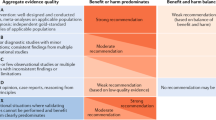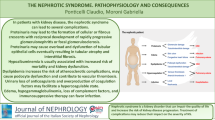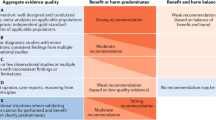Abstract
Background
Rapidly progressive glomerulonephritis (RPGN) can progress to end-stage kidney disease within a short period. This study is a continuation of the chronological nationwide survey conducted by the Japan-RPGN working group.
Methods
We examined a total of 2793 RPGN cases registered during four periods (1989–1998, 1999–2001, 2002–2008, 2009–2011) plus 1386 cases in 2012–2015. As potential prognostic determinants, we investigated the onset period, the clinical severity (CS) grade [classified according to age, serum creatinine (sCr) and C-reactive protein levels, and presence/absence of lung lesions], and causative disease.
Results
The cumulative overall RPGN patient survival at 24 months kept improving over the five periods (72.0%, 72.9%, 77.7%, 83.0%, 84.9%, p < 0.001 for trend). The cumulative renal survival also improved in the latest period (68.7%, 75.4%, 76.7%, 73.4%, 78.2%, p < 0.001 for trend). The CS grade was well stratified to predict both life and renal prognoses. Anti-glomerular basement membrane disease (aGBMD)-RPGN had a poorer renal prognosis than other diseases. In anti-neutrophil cytoplasmic antibody-associated vasculitis (AAV-RPGN, accounting for > 70% of the overall RPGN), the prognostic results were similar to that for overall RPGN. There was a much better renal prognosis for the latest period under the condition of sCr < 3 mg/dL (the 24-month cumulative renal survival: 97.9%), but not for sCr ≥ 3 mg/dL (61.5%).
Conclusions
In overall RPGN as well as AAV-RPGN, both life and renal prognoses tended to improve, but the favorable renal result was substantially limited to mild cases. There was no improvement of the renal prognosis in aGBMD-RPGN.



Similar content being viewed by others
References
Koyama A, Yamagata K, Makino H, Arimura Y, Wada T, Nitta K, Nihei H, Muso E, Taguma Y, Shigematsu H, Sakai H, Tomino Y, Matsuo S, Japan RPGN Registry Group. A nationwide survey of rapidly progressive glomerulonephritis in Japan: Etiology, prognosis and treatment diversity. Clin Exp Nephrol. 2009;13:633–50.
Yamagata K, Usui J, Saito C, Yamaguchi N, Hirayama K, Mase K, Kobayashi M, Koyama A, Sugiyama H, Nitta K, Wada T, Muso E, Arimura Y, Makino H, Matsuo S. ANCA-associated systemic vasculitis in Japan: Clinical features and prognostic changes. Clin Exp Nephrol. 2012;16:580–8.
Yamagata K, Usui J, Sugiyama H, Nitta K, Wada T, Muso E, Arimura Y, Koyama A, Makino H, Matsuo S. Clinical findings on ANCA-associated renal vasculitis from the Japan RPGN registry obtained via a questionnaire survey. Clin Exp Nephrol. 2013;17:650–1.
Yamagata K, Usui J, Sugiyama H, Maruyama S, Narita I. Temporal change in life and renal prognosis of rapidly progressive glomerulonephritis in Japan via nationwide questionnaire survey. Clin Exp Nephrol. 2019;23:573–5 (Erratum in: Clin Exp Nephrol. 2020; 24: 976-7).
Sakai H, Kurokawa K, Koyama A, Arimura Y, Kida H, Shigematsu H, Suzuki S, Nihei H, Makino H, Ueda N, Kawamura T, Gejyo F, Saito T, Harada T, Hiki Y, Yoshida M. Committee for the guidelines on diagnosis and therapy of rapidly progressive glomerulonephritis. Guidelines for the management of rapidly progressive glomerulonephritis. Nihon Jinzo Gakkai Shi. 2002;44:55–82 ((in Japanese)).
Saha M, Penderfraft WF, Jennette JC, Falk RJ. Rapidly progressive glomerulonephritis and crescentic glomerulonephritis. Brenner & Rector’s The kidney. 11th ed. Philadelphia: Elsevier; 2020. p. 1071–91.
van Daalen EE, Jennette JC, McAdoo SP, Pusey CD, Alba MA, Poulton CJ, Wolterbeek R, Nguyen TQ, Goldschmeding R, Alchi B, Griffiths M, de Zoysa JR, Vincent B, Bruijn JA, Bajema IM. Predicting outcome in patients with anti-GBM glomerulonephritis. Clin J Am Soc Nephrol. 2018;13:63–72.
Hilhorst M, Wilde B, van Paassen P, Winkens B, van Breda Vriesman P, Cohenervaert JW. Limburg Renal Registry. Improved outcome in anti-neutrophil cytoplasmic antibody (ANCA)-associated glomerulonephritis A 30-year follow-up study. Nephrol Dial Transplant. 2013;28:373–9.
Sriskandarajah S, Aasarød K, Skrede S, Knoop T, Reisæter AV, Bjørneklett R. Improved prognosis in Norwegian patients with glomerulonephritis associated with anti-neutrophil cytoplasmic antibodies. Nephrol Dial Transplant. 2015;30(Suppl 1):i67–75.
Hirayama K, Yamagata K. Anti-glomerular basement membrane disease. In: Prabhakar S, ed., An update on glomerulonephritis: Clinical and treatment aspects. INTECH; 2011. pp. 251–276.
Acknowledgements
We thank the following members of the RPGN Working Group of the Research Committee of Intractable Renal Disease of the Ministry of Health, Labour, and Welfare (MHLW) of Japan: Drs. Shinya Kaname, Tatsuo Tsukumoto, Eri Muso, Kousaku Nitta, Takashi Wada, Toshinobu Sato, Masaki Kobayashi, Junichiro Nakata, Takashi Yokoo, Yukio Yuzawa, Kouichi Asahi, Kosuke Masuya, Shouichi Fujimoto, Shinji Hirawa, Tomo Suzuki, Wako Yumura, Takashi Ito, Kazuhiko Tsuruya, Masayuki Iwano, Ken-ei Sada, Yasunori Iwata, Ryohei Kaseda, Seiichi Matsuo, Naoto Yamaguchi, and Akio Koyama. We also thank the nationwide investigators and institutions that participated in this survey and Mss. Yuko Sudo and. Keiko Fujioka for their guidance in manuscript preparation. This work was supported by grants from the Research Committee of Intractable Renal Disease of the MHLW of Japan.
The protocol of the present study was approved by the Ethics Committee of the University of Tsukuba Hospital (No. R1-020). The study was conducted according to the Declaration of Helsinki.
Author information
Authors and Affiliations
Corresponding author
Ethics declarations
Conflict of interest
All the authors have declared no competing interest.
Informed consent
The data for this survey obtained from the patients’ medical records were anonymized for personal information so that the patients cannot be identified. Informed consent was obtained from all individual patients included in the study. Each participating facility disclosed the purpose of the survey, method, survey period, survey contents, and privacy protection, and they provided all registered patients an opportunity to opt out.
Additional information
Publisher's Note
Springer Nature remains neutral with regard to jurisdictional claims in published maps and institutional affiliations.
Supplementary Information
Below is the link to the electronic supplementary material.
About this article
Cite this article
Kaneko, S., Yamagata, K., Usui, J. et al. Epidemiology and temporal changes in the prognosis of rapidly progressive glomerulonephritis in Japan: a nationwide 1989–2015 survey. Clin Exp Nephrol 26, 234–246 (2022). https://doi.org/10.1007/s10157-021-02148-y
Received:
Accepted:
Published:
Issue Date:
DOI: https://doi.org/10.1007/s10157-021-02148-y




